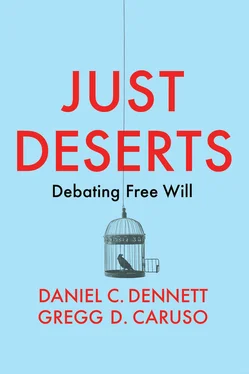Daniel C. Dennett - Just Deserts
Здесь есть возможность читать онлайн «Daniel C. Dennett - Just Deserts» — ознакомительный отрывок электронной книги совершенно бесплатно, а после прочтения отрывка купить полную версию. В некоторых случаях можно слушать аудио, скачать через торрент в формате fb2 и присутствует краткое содержание. Жанр: unrecognised, на английском языке. Описание произведения, (предисловие) а так же отзывы посетителей доступны на портале библиотеки ЛибКат.
- Название:Just Deserts
- Автор:
- Жанр:
- Год:неизвестен
- ISBN:нет данных
- Рейтинг книги:3 / 5. Голосов: 1
-
Избранное:Добавить в избранное
- Отзывы:
-
Ваша оценка:
- 60
- 1
- 2
- 3
- 4
- 5
Just Deserts: краткое содержание, описание и аннотация
Предлагаем к чтению аннотацию, описание, краткое содержание или предисловие (зависит от того, что написал сам автор книги «Just Deserts»). Если вы не нашли необходимую информацию о книге — напишите в комментариях, мы постараемся отыскать её.
Just Deserts
truly deserving
Just Deserts
Just Deserts — читать онлайн ознакомительный отрывок
Ниже представлен текст книги, разбитый по страницам. Система сохранения места последней прочитанной страницы, позволяет с удобством читать онлайн бесплатно книгу «Just Deserts», без необходимости каждый раз заново искать на чём Вы остановились. Поставьте закладку, и сможете в любой момент перейти на страницу, на которой закончили чтение.
Интервал:
Закладка:
A key feature of that careful restriction is an appreciation of its role in preserving and enhancing respect for the law. You describe my view as holding that “once we adopt the ‘system of desert’ we need to reject case-by-case judgments of what would produce the best outcomes.” Not quite right; you must add “in the immediate circumstances.” The point is that a policy of case-by-case judgments of what would produce the “best outcome” considered locally would threaten both the effective administration of justice (by inviting special pleading on behalf of either the perpetrator or the injured party or society as a whole) and respect for the law. That is the point of my examples of the biased umpire and the judge who suppresses evidence. Accepting bad outcomes in specific cases is only justified by the long-run protection of respect for the law, and whenever evidence mounts for adjustments to general policies, laws can be revised, a demonstrably better policy than “taking the law into your own hands.”
Bedau usefully lists four requirements for any justification of punishment:
Accordingly, to justify punishment we must specify, first, what our goals are in establishing (or perpetuating) the practice itself. Second, we must show that when we punish we actually achieve these goals. Third, we must show that we cannot achieve these goals unless we punish (and punish in certain ways and not in others) and that we cannot achieve them with comparable or superior efficiency and fairness by nonpunitive interventions. Fourth, we must show that striving to achieve these goals by way of the imposition of deprivations is itself justified. (2015)
You say “it’s an open question whether the moral responsibility system has the forward-looking benefits you maintain” (Bedau’s point two) and “it remains an empirical question whether, on balance, we would be better off without a system of desert. I believe we would be” (Bedau’s point three). Indeed, these are open empirical questions, but not very open! I cannot see how you can think we would be better off without a system of desert – unless you are granting me my kind of desert and merely saying we’d be better off without some as yet undescribed sort of “basic” desert (and I am quite sure we are better off without that). For without my kind of desert, no one would deserve to receive the prize they competed for in good faith and won, no one would deserve to be blamed for breaking solemn promises without excuse, no one would deserve to have their driver’s license revoked for drunk-driving, no one would deserve punishment for lying under oath, and so forth. There would be no rights, no recourse to authority to protect against fraud, theft, rape, murder. In short, no morality.
I was astonished by your sentence: “For the free will skeptic, it is never fair to treat anyone as morally responsible, no matter how reasonable, competent, self-efficacious, strong-willed and clear-sighted that person may be.” Do you really want to return humanity to the seventeenth-century English philosopher Thomas Hobbes’s state of nature, where life is nasty, brutish and short? If you have some other vision of how a stable, secure, and just state can thrive without appeal to moral responsibility, you owe us the details. Waller, in The Injustice of Punishment (2018), makes a brave attempt to do that, but even he concedes that you cannot have such a society without punishment, as announced by the title of his Chapter 2: “The Unjust Necessity of Punishment.” Well, if punishment is a necessity, it isn’t a logical or physical necessity; it’s a necessity for a viable state in which as much justice as practically possible might be achieved. In what way would such a necessity be “unjust”? In the same way, it seems to me, that it is “unfair” that everyone can’t be above average – in beauty, strength, intelligence, whatever. Life is tough, but not ipso facto unjust, and we can use our reason to make life, and its institutions, more and more just, more and more fair, a better world for all.
Caruso:Thank you for clearing some things up for me. You say that my confusion over whether you reject retributivism “baffles” you, since you “have all along stressed the ‘forward-looking’ justification [you] have presented.” I guess my confusion stemmed from the fact that earlier in the conversation you said that rejecting retributivism “doesn’t mean there is no ‘backward-looking’ justification of punishment.” You then went on to defend what looked to be a backward-looking justification of blame and punishment grounded in desert. If, instead, you adopt a forward-looking consequentialist account of punishment, then I’m happy to retract my earlier charge that you are a retributivist in all but name. That said, by adopting a forward-looking consequentialist justification, your view comes much closer to that of the skeptic. The main difference, it seems, is that you want to retain the language of desert while the skeptic wants to consign it to the flames – along with libertarian free will, retributivism, and the idea of being self-made men and women (all of which you reject as well).
You go on to say: “I cannot see how you can think we would be better off without a system of desert.” Well, for me, the notion of basic desert, which has been my target all along, is a pernicious one that does more harm than good. If that is not the sense of desert you have in mind, then so be it. But my claim is that basic-desert moral responsibility, and with it the notion of just deserts , is too often used to justify punitive excess in criminal justice, to encourage treating people in severe and demeaning ways, and to excuse and perpetuate social and economic inequalities. Consider, for example, punitiveness. Researchers have found that stronger belief in free will is correlated with increased punitiveness. They also found that weakening one’s belief in free will makes them less retributive in their attitudes about punishment (for details, see Shariff et al. 2013; Clark et al. 2014; Clark et al. 2018; Clark, Winegard, and Sharrif 2019; Nadelhoffer and Tocchetto 2013). These empirical findings concern me.
There are additional concerns as well. As I argue in Rejecting Retributivism (2021a), the social determinants of criminal behavior are broadly similar to the social determinants of health. In that work, and elsewhere, I advocate adopting a broad public-health approach for identifying and taking action on these shared social determinants. I focus on how social inequities and systemic injustices affect health outcomes and criminal behavior, how poverty affects brain development, how offenders often have pre-existing medical conditions (especially mental-health issues), how homelessness and education affects health and safety outcomes, how environmental health is important to both public health and safety, how involvement in the criminal justice system itself can lead to or worsen health and cognitive problems, and how a public-health approach can be successfully applied within the criminal justice system. I argue that, just as it is important to identify and take action on the social determinants of health if we want to improve health outcomes, it is equally important to identify and address the social determinants of criminal behavior. My fear is that the system of desert you want to preserve leads us to myopically focus on individual responsibility and ultimately prevents us from addressing the systemic causes of criminal behavior .
Consider, for example, the crazed reaction to the then US president Barack Obama’s claim that, “if you’ve got a [successful] business, you didn’t build that alone.” The Republicans were so incensed by this claim that they dedicated the second day of the 2012 Republican National Convention to the theme “We Built it!” Obama’s point, though, was simple, innocuous, and factually correct. To quote him directly: “If you’ve been successful, you didn’t get there on your own.” So, what’s so threatening about this? The answer, I believe, lies in the notion of just deserts . The system of desert keeps alive the belief that if you end up in poverty or prison, this is “just” because you deserve it. Likewise, if you end up succeeding in life, you and you alone are responsible for that success. This way of thinking keeps us locked in the system of blame and shame, and prevents us from addressing the systemic causes of poverty, wealth-inequality, racism, sexism, educational inequity and the like. My suggestion is that we move beyond this, and acknowledge that the lottery of life is not always fair, that luck does not average out in the long run, and that who we are and what we do is ultimately the result of factors beyond our control.
Читать дальшеИнтервал:
Закладка:
Похожие книги на «Just Deserts»
Представляем Вашему вниманию похожие книги на «Just Deserts» списком для выбора. Мы отобрали схожую по названию и смыслу литературу в надежде предоставить читателям больше вариантов отыскать новые, интересные, ещё непрочитанные произведения.
Обсуждение, отзывы о книге «Just Deserts» и просто собственные мнения читателей. Оставьте ваши комментарии, напишите, что Вы думаете о произведении, его смысле или главных героях. Укажите что конкретно понравилось, а что нет, и почему Вы так считаете.












